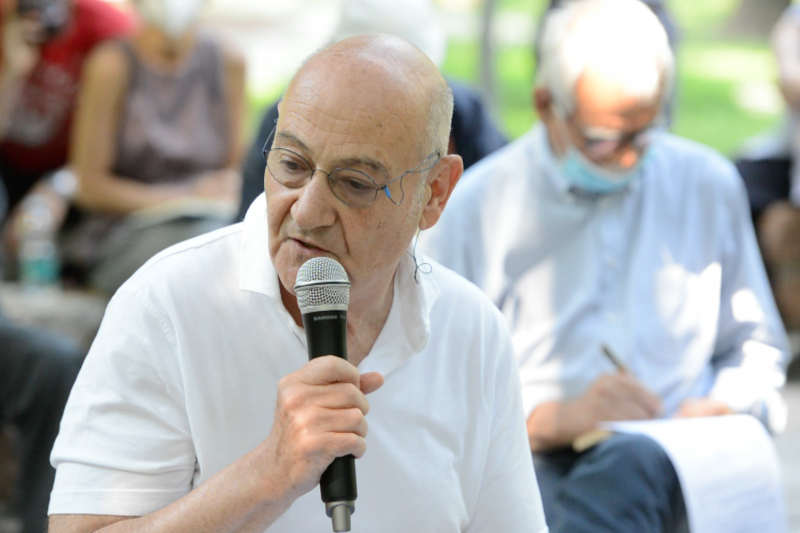Since its inception, Gariwo has promoted several cultural operations. First of all, we have promoted the memory of the Righteous, that is, of those who saved lives during the Shoah. This is how the notion of Righteous originated: as a condemnation to indifference and to shed light on the possibility to react against evil and take our destiny into our own hands.
Thanks to the European and the Italian Parliament, we consequently extended the notion of Righteous to all genocides and promoted the creation of Gardens all over the world. In the coming years, we want to take a step further: we aim to tighten the link between the notion of Righteous to the UN Convention for the Prevention and Punishment of the Crime of Genocide.
Our aim is for all Parliaments in Europe and around the world to recognize the Day of the Righteous and to consider it a way of applying Raphael Lemkin’s Convention, which the UN adopted in 1948. Without such a perspective, our moral message runs the risk of being generic. We can only broaden public interest in the Righteous if this notion links to the idea of the Convention, which the majority of Parliaments in the world have ratified. Hence, we need to clearly define the meaning of the memory and promotion of the Righteous: namely, preventing extreme evil in the present as well as in the future.
For this reason, we have asked the Italian Parliament to approve three proposals: an annual report on potential genocides and mass atrocities across the world, providing indications on how to actively intervene to avoid the most dangerous crises; the appointment of an advisor on genocides who would be responsible for these reports to the public; the construction of an independent commission for human rights. Italy, which approved the Convention on June 4, 1952, has done very little to fulfill its commitment when genocides occurred after the Shoah, in Cambodia as well as in Rwanda. We want to commit ourselves so that not only our country takes up the spirit of the Convention, but it also becomes the messenger of the Day of the Righteous in the world by supporting the European Community: to commit to peace initiative is the very heart of our country.
To spread the idea of the Righteous internationally means to educate societies in the complex art of preventing evil. Our humanist culture, which could turn into the moral pride of our country at an international level, gives us all we need to fulfill this task. This is why Gariwo has built fruitful and important collaborations with many of our embassies abroad.
To better understand our goal, it will be helpful to reflect on the thought of Raphael Lemkin, the great architect of the Convention at the United Nations. The Polish Jewish jurist had important insights, which linked his experience as a Shoah survivor to his theoretical thinking.
By coining the term “genocide”, a definition that had never existed before, Lemkin aimed to unite the Jewish drama with all the exterminations in history. Not only did Lemkin want to be a Jew who demanded justice for his people, but also a Jew who dragged humanity into fighting all genocides.
A Spinozian perspective characterized the thought of Lemkin, who thought that it was helpful for Jews (as for the Armenians and others who had suffered a massacre) to unite the entire humanity against the ideology of extermination. In Lemkin’s view, there was no such thing as a profit only for oneself, for one's own survival. On the contrary, he believed in the gain for the protection of everyone. Without an international law binding all countries worldwide to a shared agreement, no people could ever have been saved.
Lemkin then thought that, for victims, the only possible redemption lay in the prevention of genocides, that only the future could redeem the past. Thus, the memory of the victims had to become a tremendous force to set a new course for humanity.
In Lemkin’s view, no restorative justice could redeem the rubble, for lives were forever destroyed. He also thought that, in post-war trials, it would have been impossible to judge the millions of Germans who had variously participated in the Jewish extermination and had remained indifferent. This could only be done for some of them, but the trials would have been of little use if new shared values and new institutions had not been established to prevent genocide before the executioners carried out their plans.
After the death of his parents at the hands of the Nazis, Lemkin made a promise: he would have remembered and honored them through his commitment to the United Nations. In this light, Lemkin shared the same drive as Etty Hillesum, who the Germans prevented from realizing the dream she had elaborated in her diaries before her deportation: to rethink the aftermath and rebuild a world without a drop of hatred. A goal to always pursue as a horizon of life.
With his extraordinary battle for the Convention, Lemkin thus wanted to show humanity an unprecedented new commandment: you shall never commit genocide. This new term (until then, there was no word for mass extermination) was meant to arouse shame. For Lemkin, genocide was not only a war crime, as it was thought at Nuremberg. Genocide also occurred in peacetime, every time the exclusion and elimination of national ethnic, religious, and political groups were planned.
The awareness of genocide was meant to give a new start to the world after the Second World War. Until then, not only did these actions remain unpunished, but states could lawfully persecute minorities, up to their suppression, in the name of the principle of national sovereignty and their laws. No one had the right to intervene. When Lemkin, with great intelligence, raised the question of intentionality behind every genocide, he introduced the question of choice. Genocide is not a tsunami, a natural event, but it is caused by men who decide to do it: behind every extermination, there is a choice, even without a Mein Kampf to prove it. Lemkin thought that genocide could occur not only with a stated intent but also by creating the conditions for a genocide to happen.
Lemkin’s reflection on intentionality captured two aspects. On the one hand, what is legally known as dolus specialis, that is, when the criminal acts with the direct and manifest intent to kill, which brings judges to draw on the objective evidence of the intentions of the murder in the act of conviction. On the other hand, Lemkin’s notion of intentionality had to do with the definition of dolus eventualis. Namely, when the criminal puts in place practices that objectively create the possibilities and conditions of a murder.
Lemkin also posed the question of genocide not only as concerning the affected minority but also as an impoverishment of humanity as a whole. I remember a statement he made (1): "If the Jews condemned by Germany had not been allowed to create the Bible and give birth to a Spinoza or an Einstein, if the Poles had not been given the opportunity to offer the world a Copernicus, a Chopin, or a Curie, if from the Czechs there had not been a Huss or a Dvorak, from the Greeks a Plato and a Socrates, and from the Russians a Tolstoy or a Shostakovich, every nation would have suffered an irreparable loss."
No genocide does not touch all of humanity. Indifference is thus a feeling that harms everyone: one cannot be indifferent to something that hurts the whole of human plurality, including the indifferent person him/ herself. Behind irresponsibility, there is not only the abandonment of the victim but also one's own self-destruction.
As Lemkin wrote in some of the notes there were later found in his archives, he thought it was necessary to always ask three fundamental questions: what are the objectives of the genocidaires? What are their motivations, even if they seem the most whimsical? What techniques of genocide are perpetrators implementing?
The political tasks of the UN Convention were rooted in the answers to such questions: to monitor hate speech and the ideologies leading to genocide; the right of UN interference in international crises to stop ongoing genocides (not through a total war, but through a combination of political, military, diplomatic, and moral pressures that bring the programs of the potential perpetrators to a halt); the creation of international tribunals as a moral deterrent (Lemkin was convinced that states were not abstract entities, but contingent expressions of flesh and blood men who could be affected by moral condemnation).
How does Gariwo fit into all this? Through the narration of the Righteous and the enhancement of their stories, we want to teach society to prevent genocide and all forms of hatred that create the conditions for exclusion and dehumanization.
The Righteous teach how to think and how to act. They represent a tremendous ethical example, one that is able to foster a mechanism of emulation in society. With their actions, the Righteous inspire us with individual behaviors that allow us to prevent genocides. They make us understand that everyone, in his personal space, can contribute to extinguishing the signs of hatred that can lead the world in a bad direction.
The philosopher Jan Patocka argued that we should never separate the day from the night in our existence because man must always be aware of the worst to act: if you do not know death and degradation, you cannot live life. On the contrary, the totalitarian regimes denied the night and proposed a society without pain, harmonious and pacified, where evil was abolished with an artificial operation that led to the de-responsibilization of human beings.
We, on the other hand, value the Righteous not only because we want a better world, one that is inclusive, open to dialogue and respect, one that makes us appreciate the beauty and the miracle of the human condition, but also because we want to explain that, if we show ourselves to be immature, the abyss is always just around the corner.
When he pointed out that individuals, and not states, were responsible for genocides, Lemkin had sensed what really was at stake: namely, the gray zone of indifference. There was never collective guilt, but everything was always the result of an individual's choice.
And if the responsibility is individual and singular, then the Righteous always represent salvation.
From today, therefore, Gariwo’s great objective is to give strength to the Lemkin Convention with an additional "chapter": the enhancement of the Righteous as moral examples.
NOTES:
1. New York Times, October 20, 1946








